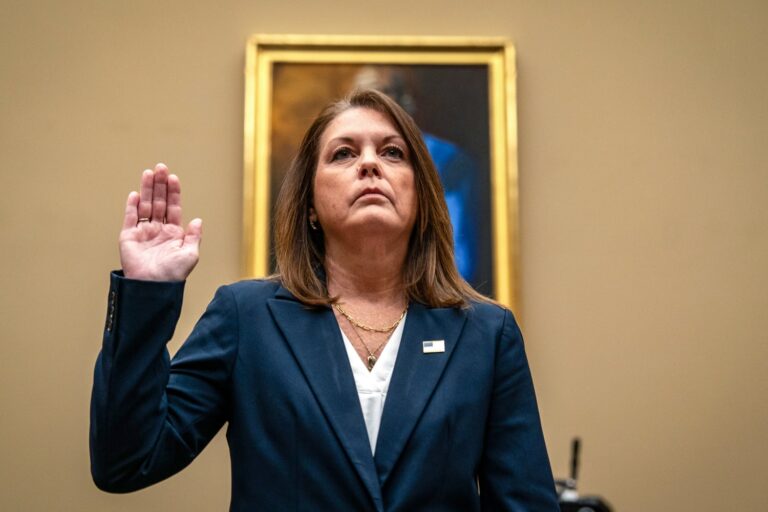Secret Service Director Kimberly Cheatle accepted responsibility for security failures that led to the assassination attempt on former President Donald Trump on Monday, but dodged some key questions in visibly frustrated testimony before the House Oversight Committee.
In his opening remarks, Cheatle called the shooting “the most serious operational failure of the Secret Service in decades.” He said he was determined to find out what went wrong at a Trump rally in Butler, Pennsylvania, on July 13, when a gunman shot Trump in the ear from the roof of a nearby building, killing one rally attendee and wounding another.
“I accept responsibility for this tragedy,” Cheatle said. “We will investigate why this happened and take corrective steps to ensure this never happens again.”
Cheatle, who was called to testify, was roundly criticized by committee members from both parties and told he should resign due to “incompetence,” “lame excuses” and what they called a lack of answers to basic questions.
Cheatle did not provide clear answers to questions from committee members about whether the Secret Service was guarding the building where the shooter opened fire or how he gained access to the roof.
“I won’t go into the details of that day,” she said, citing the ongoing investigation. “Plans were in place to provide surveillance, but responsibility is still being investigated.”
Asked by other committee members how many agents were assigned to protect Trump that day and how many times the Secret Service had denied Trump’s requests for additional security, she declined to provide specific figures.
Cheatle said police provided the requested assets for the July 13 rally and that he felt Trump had “a sufficient number of agents assigned to him” that day.
Cheatle told the committee that the shooter had been “identified as a suspicious individual” before Trump took the stage. He said that because the shooter had not yet been identified as a “threat,” Trump was allowed to go up to the podium, where he was shot.
Rep. Raja Krishnamoorthi (D-Ill.) said the shooter should have been considered a “threat” and that the rally should have been paused before Trump began speaking when the crowd began yelling that there was an armed man on the roof.
“It’s a real threat,” Krishnamoorthi said.
Cheatle said the department was “still reviewing the content of the communications and when they were passed on.”
Cheatle said the shooter appeared to have acted alone but changed from a suspicious person to a threat “seconds before” the shooting began.
Cheatle said counter-snipers “do not have to ask permission” to fire threatening shots, adding that no orders had been given to refrain from firing.
In response to a question about how he communicates, Cheatle said he sometimes uses encrypted apps to communicate with colleagues, but not on his work devices.
About an hour into the hearing, exasperation among some committee members became apparent when Rep. Gerry Connolly (D-Va.) asked Cheatle whether a gun would make her job easier or harder. Cheatle would not answer yes or no, frustrating Connolly.
“Answer the question. You’re the director of the Secret Service,” Connolly said. “And right now, I think you’re avoiding the answer, but the answer is not a difficult one.”
Later, Republican Senator Pete Sessions of Texas also demanded clear answers, raising his voice and pointing repeatedly: “Tell me what went wrong!” he said.
Two hours into the hearing, Rep. Nancy Mace, D-Ore., was instructed to be civil as she blasted Cheatle for dodging questions and being “totally dishonest” about cooperating with the committee.
“You’ve been lying all day today!” she said. “We’ve asked you to answer questions so many times.”
Republican Rep. Michael Turner of Ohio said Cheatle only appeared “incompetent” because Trump survived, but if Trump had been killed, Turner told Cheatle, “you would have been viewed as guilty.”
Despite calls for him to resign, Cheatle was determined to stay on as chief, touting his nearly 30-year career with the agency.
“I have conducted my duties in good faith,” Cheatle said, “and I promise the committee that I will respond with a full and complete report once we have it.”
Cheatle said the goal is to have a full report out within 60 days, but lawmakers criticized that as unacceptable and too long.
“We’re nine days in,” said Rep. James Comer, a Republican from Kentucky who chairs the committee. “Every American wants these questions answered.”

